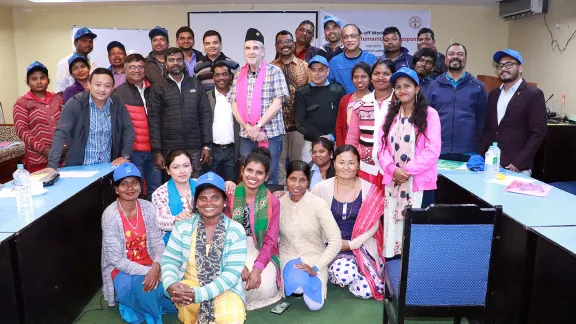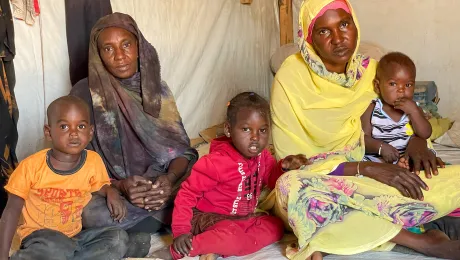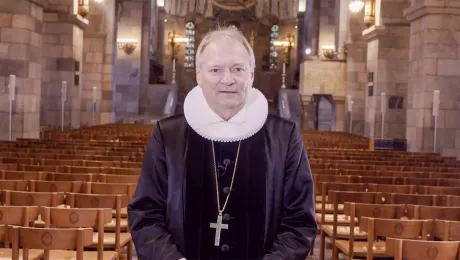
Participants at a workshop in Nepal in December 2019 develop ideas on how to pilot the âChurches and Emergenciesâ program in the two target communities. Photo: LWF/NELC
New LWF program helps member churches be better prepared to deal with emergencies and natural disasters
(LWI) - When a 7.8 magnitude earthquake hit central and eastern Nepal on the morning of 25 April 2015, Rev. Marandi Patras, General Secretary of the Nepal Evangelical Lutheran Church (NELC), remembered the Lutheran World Federation (LWF) training he had attended the previous year in Cambodia. It was a workshop on disaster preparedness and emergency response where he learned how to help his church to respond to such natural disasters. This knowledge was crucial as the NELC began to raise funds and assist affected communities.
“We managed to help many people, but at the same time the earthquake showed that the church was, in general, not well prepared for such an emergency”, Rev. Patras reflects. One major challenge was the remoteness of many affected communities, he adds, making it difficult to access survivors and provide timely assistance. No stocks of food or hygiene kits were in place in the communities, leaving the most vulnerable isolated for days without food or other life-saving equipment. In the end, the earthquake killed nearly 9,000 people and injured more than 22,000.
Serving all ethnic and religious communities
The NELC has learnt much from this experience. With the help of the LWF World Service Nepal program, the church has increased its capacity to prepare for and respond to such tragedies. When widespread flooding affected large parts of the country in August 2017, the NELC was able to respond in a much more timely and effective way.
Like Lutheran churches in many countries, the NELC is committed to serving the most vulnerable, regardless of their ethnic or religious background, as part of their diaconal work. Church president Rev. Joseph Soren confirms that people in dire need seek help first and foremost from the local church: “Long before humanitarian NGOs and their aid workers arrive, local churches can assess the damages and distribute whatever relief items are available, such as food and tents, water and medical aid.”

Small groups at a workshop in Nepal in December 2019 develop ideas on how to pilot the “Churches and Emergencies” program. Photo: LWF/NELC
At the end of 2019, representatives from the church came together with LWF World Service staff to discuss how this experience and knowledge can be further deepened in the framework of a new LWF program called “Churches and Emergencies.” From 2020, the LWF is providing support to member churches to set up sustainable structures for effective emergency preparedness and response work. In close collaboration with LWF World Service experts on the ground, churches in Nepal, Myanmar and Cameroon will pilot the program in two target communities per country.

Farmers collect food to store in the grain bank established by LWF Nepal at Rangeli Municipality. The NELC plans to set up similar grain banks in the two pilot communities. Photo: LWF Nepal
In Nepal, both predominantly non-Christian pilot communities are located near rivers and affected by annual flooding. NELC representatives, together with LWF staff on the ground, visited the communities in January 2020 and developed an annual implementation plan. Alongside advocacy activities at a national level and regular training with the two target communities on disaster risk reduction, first aid and psychosocial support, another integral part of the plan is the establishment of community grain banks.
“Besides water, sanitation and shelter, the other crucial factor for saving lives after a disaster is food”, explains Gopal Dahal, Coordinator of the Emergency Response & Disaster Risk Reduction Program for LWF World Service in Nepal. “This is why we want to establish a mechanism in the two target communities so that people can access food immediately after a disaster until external help comes in.”
We want to see empowered communities that understand the risks of disasters and are prepared if something happens.
The church plans to collect small grain contributions during the next harvesting time from farmers, based on land size and production. Those grains will then be distributed to most vulnerable families in case of a disaster. If no emergency strikes during the year, the old grain stock will be sold at the time of the next harvest, and a new stock will be established. The money will be kept as a local emergency fund managed by an inclusive community-based committee.
Rev. Patras looks forward to implementing the “Churches and Emergencies” program this year, and to share the experience from Nepal with churches from the other target countries, Cameroon and Myanmar. “We want to see empowered communities that understand the risks of disasters and are prepared if something happens. The church can be a witness in those contexts by reaching out to the needy through its diaconal and spiritual work.”
The Nepal Evangelical Lutheran Church grew out of a movement of lay people in the 1930s and was officially established in 1943 with the support of the church in northern India. The NELC joined the LWF in 2010 and today includes around 1.200 members.
LWF World Service has been working in Nepal since 1984 with refugees, host communities, displaced (IDPs) and people at risk with socioeconomic, and climate and disaster vulnerabilities. Through a variety of community-based programs it seeks to ensure equal access to livelihoods, quality services, protection and social cohesion.


